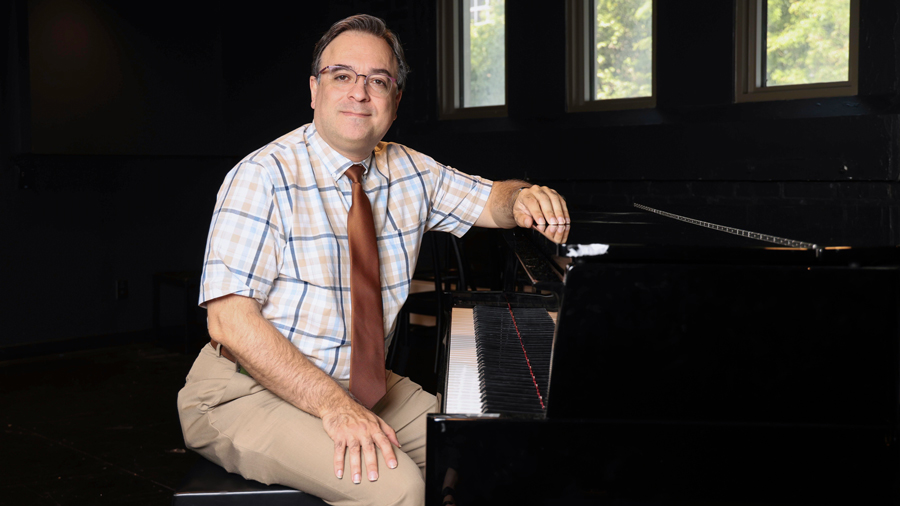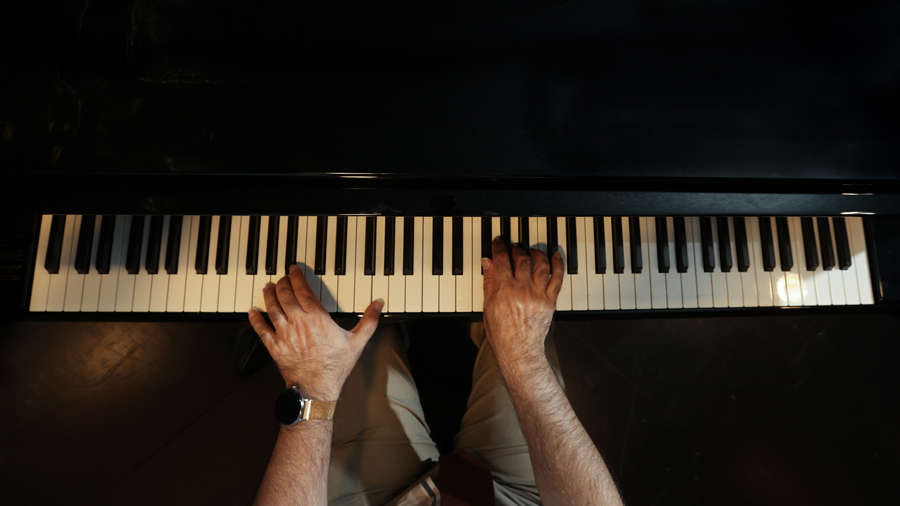A Melodic Therapy
Harnessing the power of music to treat anxiety in individuals with Alzheimer’s and their caregivers.
By: Ananya Chandhok
Photos by: Teresa Crawford
Music and medicine often walk in step with each other. Underneath their rhythms lies a truth many have heard time and time again: music is medicine.
Borna Bonakdarpour, PhD, assistant professor of neurology at the Mesulam Center, understands this connection between the two disciplines. In his lab, he fuses improvisatory music with interventional treatment for persons living with Alzheimer’s and their families.
Working with individuals experiencing cognitive disorders — including memory problems, language difficulties, and visual processing — he transforms medicine into a symphony.
“I came to this discipline because of language and music,” he said reflecting on his medical degree and minor in piano and musicology. “I wanted to cross both.”
He spoke to the Center about the importance of using music as interventional anxiety treatment for people with cognitive impairments and their care partners, and he reflected on his hope for a future where music and medicine become synonymous with each other.

Borna Bonakdarpour, PhD, was the lead author on the paper "Calming effect of Clinically Designed Improvisatory Music for patients admitted to the epilepsy monitoring unit during the COVID-19 pandemic: a pilot study." In the study, him and his team explored investigated how music can be used to reduce anxiety levels in individuals with Alzheimer’s and their care partners.
Healing with improvisatory music
In September 2023, Bonakdarpour’s pilot study, “Clinical Improvisatory Music for Alzheimer’s Disease Anxiety and Caregivers” (CIMAC), was published in Frontiers in Neurology.
Preliminary results showed that administering Clinically Designed Improvisatory Music (CDIM) reduced anxiety levels in individuals with Alzheimer’s and their care partners.
During the study, participants received eight sessions of improvisatory music designed by the clinic. Both individuals with Alzheimer’s and their care partners were then evaluated for post-session anxiety levels. Bonakdarpour and his team presented their first year’s results at the American Neurological Association
(ANA) meeting in Orlando this year. Their analysis showed a reduction in patient anxiety and a reduction in caregiver burden. They also saw a decrease in heart rate and blood pressure because of reduced anxiety and stress in both groups.
“One of our participants, who had a high degree of anxiety and very high blood pressure, felt less anxious after eight sessions,” Bonakdarpour said. “They shared that their mind was ‘clearer,’ making decisions much easier.”
Once participants completed their sessions, they were provided with the music that they listened to during the study, so they could sustain the effects.

Bonakdarpour's Music and Medicine Program offers quarterly Musical Museum events, aimed at creating a secure and enriching environment for individuals affected by Alzheimer's disease, related conditions, and their care partners.
An alternative to pharmacological treatment
The study was inspired by Bonakdarpour’s passion for music. “We believe that music, as a sonic tool and regardless of autobiographical memory, can modulate the state of the mind to ease anxiety and stress,” he said.
He also wanted to understand alternatives to traditional interventions, which often focus on medication management. The medication route, used alone, comes with risks of side effects and polypharmacy, or regular usage of five or more medications at the same time.
In the CIMAC study, he took a note from past research that used music as an intervention for individuals living with Alzheimer’s, but he saw a gap in the field, since the majority of studies focused on later stage Alzheimer’s. His focus shifted to early-stage Alzheimer’s. He was curious to see how anxiety levels changed by treating participants in dyads — groups of two composed of one person living with Alzheimer’s and their care partner.
“Music not only helps the patients, but it also helps the caregivers who are very commonly stressed out and burdened with the disease,” he said.
Bonakdarpour looks forward to the next two years of the study, hoping to continue prescribing music as treatment. “We’re continuing to recruit more individuals with Alzheimer’s disease and caregivers,” he said. “We’re also waiting to collect enough functional magnetic resonance imaging (fMRI) data, so we have the power to interpret the results.”
If outcomes are favorable, the team will expand the project into a larger placebo-controlled study. As for the future of music and medicine, Bonakdarpour hopes to pave the way for a Music and Medicine Center within the Feinberg School of Medicine.
“We need a dedicated Center to have the infrastructure and means for a robust clinical program,” he said. “We need to have a full-time dedicated research team to be able to expand the education of music and medicine at Northwestern.”